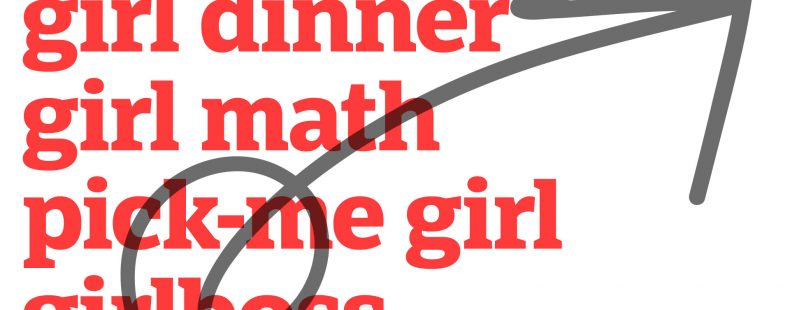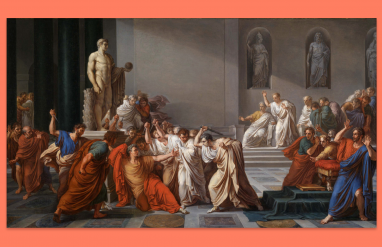Girl dinner. Girl math. Lazy girl job. Viral phrases and trends focused around the word girl are everywhere lately, blowing up on TikTok and spreading online and IRL. What’s behind the power of girl?
To help you keep up with all the trends and their origins, we’ve gathered up all the latest girl terms into a single girl gallery. We’ll take a closer look at the ones that have taken social media by storm as well as some of their girl precursors (from it girl to valley girl) to explain exactly how we got to this point.
Along the way, we’ll highlight the role that girls and women have played in coining and popularizing many of these terms, explore some of the reasons why girl is often used when referring to women, and unpack some of the criticism around the terms—including why such words often don’t have a male counterpart.
girl dinner
Let’s start with the tasty term girl dinner, which seems to be the meal of the moment! Girl dinner refers to a meal that could also be considered a snack tray or charcuterie board. A girl dinner consists of small amounts of random foods, such as slices of cold meats, cheeses, bread, crackers, fruits, vegetables, chips, and popcorn.
The term and concept of girl dinner was coined by TikTok user Olivia Maher in a video posted on May 11, 2023. Maher referred to a meal consisting of bread, butter, cheese, grapes, pickles, and a glass of wine as a girl dinner. The video went viral on TikTok, and other users began sharing their own versions of girl dinner. As part of the meme, girl dinner has also been used humorously to refer to things that aren’t food, such as attractive men or depressing poetry.
girl math
The term girl math emerged as a part of a TikTok trend popular in August 2023. Girl math is a humorous phrase that refers to illogical or nonsensical personal finance beliefs. For example, the idea that buying something with cash means you spent no money on it or the rationalization that anything that costs less than $5 is basically free might be dubbed girl math. (And if you don’t buy something on sale, you’re basically losing money, right? That’s girl math.)
@mckennaelianna somehow it makes sense #girlmath 🤷🏼♀️
On social media, girl math is largely seen as a playful in-joke among women who are aware of their own idiosyncratic spending habits. However, some have criticized the girl math trend for promoting the stereotype that women are less financially responsible than men.
lazy girl job
This one seems to be a product of the times. The term lazy girl job was coined by Gabrielle Judge, also known as “Anti Work Girlboss,” who defined it in a TikTok video posted on May 22, 2023. In the video, Judge defines a lazy girl job as a remote job that pays a comfortable salary, has flexible work hours, and allows a person to have a reasonable work-life balance. A lazy girl job is not stressful, and a person doesn’t have to work hard to do it. According to Judge, a lazy girl job is desirable for women who want a healthy work-life balance because they have children, for example.
The name lazy girl job doesn’t imply a person who has such a job is “lazy” in a negative way. Lazy is used in a similar manner here as it is commonly used in the antiwork movement: to mean a person values work less than their personal time. Lazy girl job also seems to have been motivated by the recent term quiet quitting, as Judge compared the two terms in her video.
Since Judge coined the term, lazy girl job has become a popular viral phrase on TikTok. It is often used in videos that push back against so-called “hustle culture” and by people that support the idea that work should primarily be an unstressful way to fund hobbies and leisure.
lucky girl syndrome
Lucky girl syndrome emerged during January 2023 on TikTok and has remained extremely popular ever since. Lucky girl syndrome refers to a person who is unnaturally lucky and has everything go their way. Commonly, those who use the term lucky girl syndrome may attribute exceptional luck to their own ability to manifest it. For example, a person affirms they will find a new job and then they immediately do. Lucky girl syndrome videos often feature a person in a lucky situation, or they encourage others to use positive affirmations to increase their luck.
The hashtag #luckygirlsyndrome is very popular on TikTok. However, the idea of lucky girl syndrome has been occasionally criticized for various reasons, such as creating unreasonable expectations or being based on confirmation bias. At the same time, psychologists have pointed out that there are legitimate benefits to a positive mindset. Also, the idea that a positive mindset can lead a person to success isn’t unique to this term and has existed in different forms.
hot girl walk
The hot girl walk is an exercise routine created in 2020 by Mia Lind, known as @exactlyliketheothergirls on TikTok. The routine is fairly simple and has a person walk four miles outdoors while listening to music or a podcast. According to Lind, the only “rule” of the hot girl walk is that the person walking can only think about three things as they exercise: things to be grateful for, how to achieve their goals, or “how hot they are.”
Lind introduced the hot girl walk on TikTok and the routine became a popular trend on the platform. The term hot girl walk remained popular on the site over the next several years, helped by marketing from Lind.
Girls of the past
Girl words are capturing everyone’s attention right now. But how did we get here? There have been a number of popular girl terms—both short-lived and long-lasting—that have captured our attention over the years.
Sticking with the 2020s, we have the that girl TikTok trend of women aspiring to be their best selves. Going further back to the 2010s, we have the hot girl summer popularized by Meghan Thee Stallion that many claim to have kicked off this girl terms trend. But the 2010s also gave us the attention-seeking pick-me-girl, the ambitious girlboss, and the VSCO girl that was popular for a hot minute.
The 2000s brought us the manic pixie dream girl, and Mean Girls (2004) popularized a term for ruthless cliquey teens and women. And in the decades of the last century we have had the Riot grrrl punk rock movement, and terms such as Valley girl, material girl, the final girl from horror movies, the girl next door, and the it girl that has managed to maintain its popularity since the 1920s.
What does seem to be new, though, is the frequency of girl terms emerging that are not linked to a male counterpart. Let’s focus on that a bit more.
Why the word girl?
In the past, many girl terms existed as a female version of a phrase that had a male counterpart that used the word boy. For example, you have the obsessive fanboys and fangirls, the breakdancing b-girls and b-boys, and the spoiled mama’s boys and daddy’s girls. At times, the word girl has been used to emphasize femininity as the opposite of masculinity, as in the term girly girl being the very feminine counterpart to the very macho manly man.
At the same time, girl was and is often used as the female equivalent of the word guy as a more generic term. For a recent example, the nice girl is the female counterpart of the reviled nice guy. For more examples, we have the girl code and guy code, girl talk and guy talk, and go-to-girl and go-to-guy.
And this is what makes this emerging trend of girl terms so interesting: the word girl in some cases seems to be going solo as a generic word for a person, at least for now. The terms girl math, girl dinner, lazy girl job, and lucky girl syndrome exist without any guy versions—at least, any version nearly as popular.
The explanation behind this seems to be simple enough: these terms and memes were created by or are popular among girls and women, so the generic girl is doing the job that the generic guy has so often done in the past. Still, some criticize terms like these as being rooted in stereotypes about women—when in fact the concepts they refer to are likely relatable to many men, too.
So why girl—and why not woman? Recent coverage in the The New York Times noted that women like the “communal element” of the word girl and deliberately use it to promote camaraderie. But while the word may appeal to some women for this reason, others may bristle at its connotations—or the fact that these terms have appeared without a male equivalent.
It’s worth noting that, unfortunately, there are already a number of words in the English language used to refer to women, particularly when it comes to sex and relationships, that don’t have a male equivalent. Words like mistress and spinster aren’t just descriptors: they are labels that reflect an undercurrent of sexism in society. Associating negative traits such as laziness or an inability to understand math is considered by some as perpetuating negative stereotypes of women.
These girl terms and trends are likely to continue emerging from TikTok and elsewhere. As they do, wise girls will be watching for changes to more than just language.
Take the (girl) quiz
Now that you’ve learned about some of the most popular “girl” terms on TikTok and beyond, can your lucky girl syndrome help you ace our girl words quiz? (No need to be a girlboss, but it might help!)












